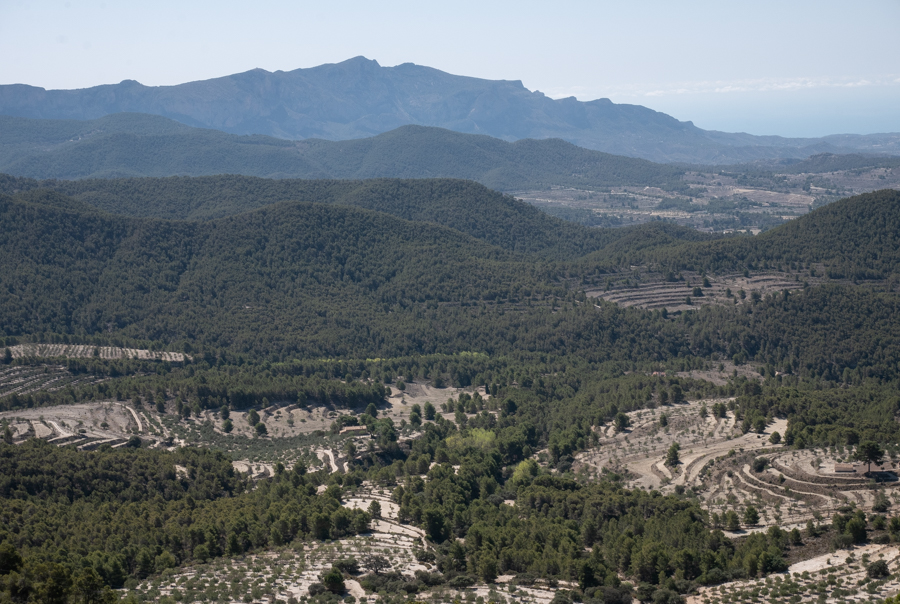Every year I go to Madrid for a day two or three times. Thanks to the high-speed train, the 450 km from Alicante to Madrid is covered in 2 hours and 20 minutes in comfort and at a cost less than the cost of fuel I would have used if driving. So a no-brainer, really. The reason for spending a day in Madrid is to look at art; sometimes this means visiting the great cultural institutions such as the Prado or Reina Sofía. This week, taking advantage of starting my summer vacation, I went to look at photography exhibitions, part of the annual PhotoEspaña festival.
The other event this week was a bike ride to the Carrasqueta mountain pass, climbing from sea level to 1020 meters altitude over 35 km (and then enjoying the long descent). It is a strenuous ride at any time, but even more so in July with the high temperatures we have, especially once one leaves the coast and its see breezes.
29_1
But first some images from my daily life in Alicante. On Sunday, we went for lunch again at the Casa Sicilia winery about 40 km from here, and again with the same friends as on the previous occasion. However, with tempertures outside approaching 40C, we opted to sit inside this time, as did virtually everyone else:

29_2
I did poke my nose outside to look at the vines:
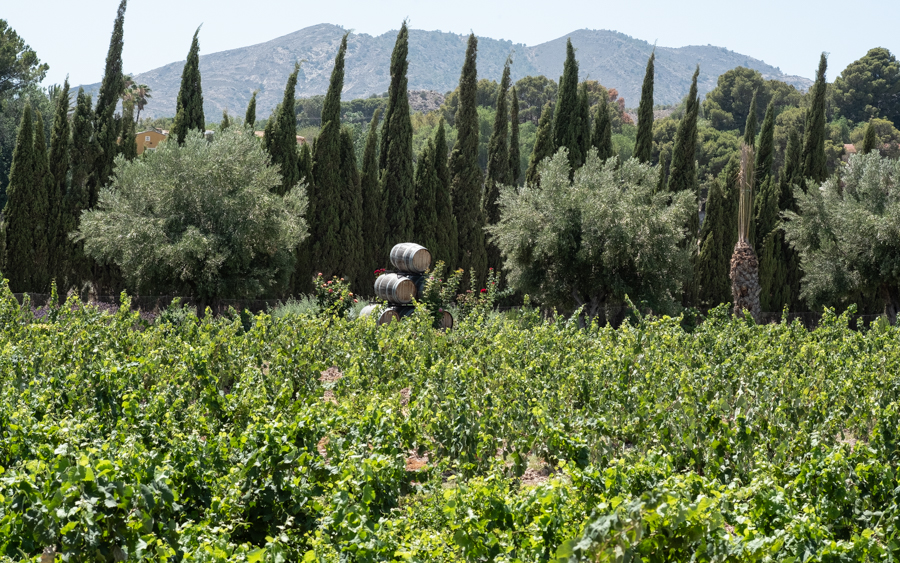
29_3
On a hillside, the Castillo de la Mola, a Moorish castle built in the 12th century:
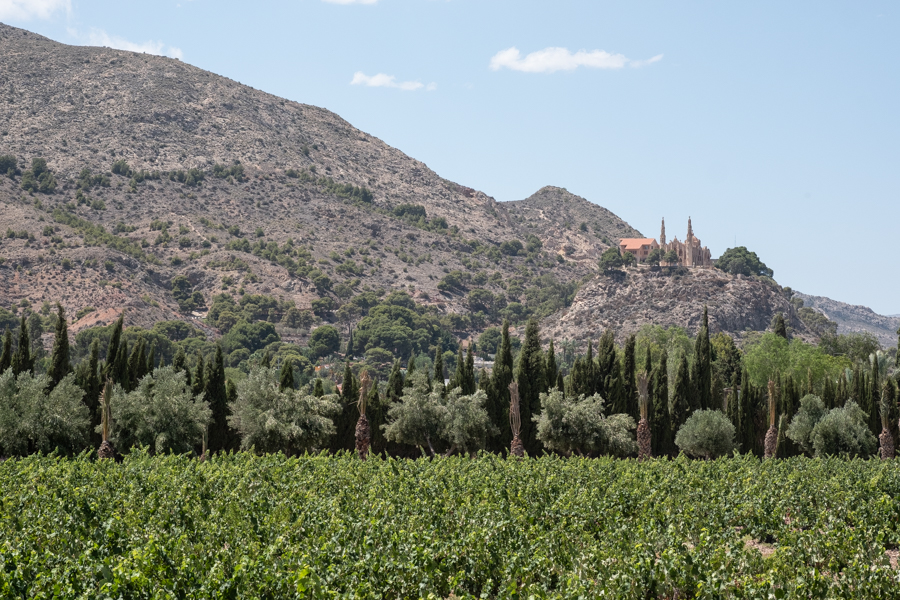
29_4
Just about the only people lingering outside were the smokers, and the restaurant provided some water mist to help them keep (relatively) cool:
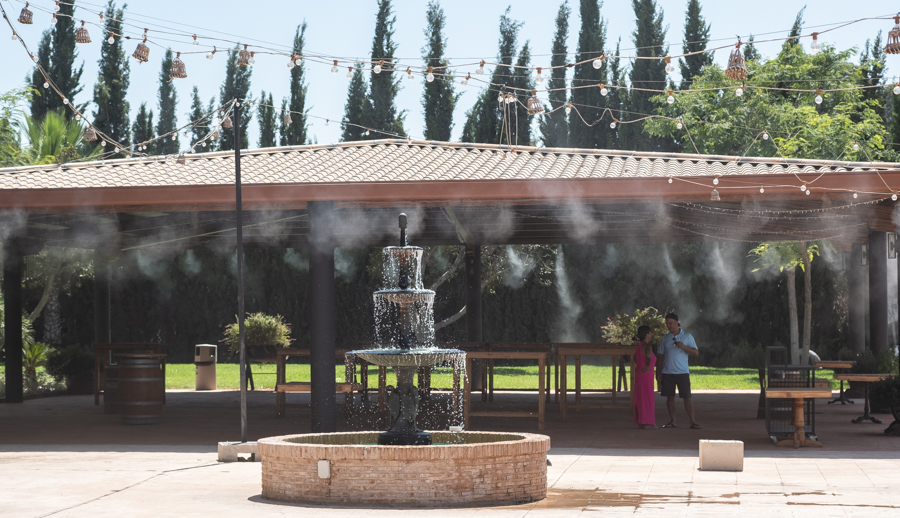
29_5
A couple of mid-week bike ride photos. The castle ruin in Busot, with the workers who are restoring it, taking a break:
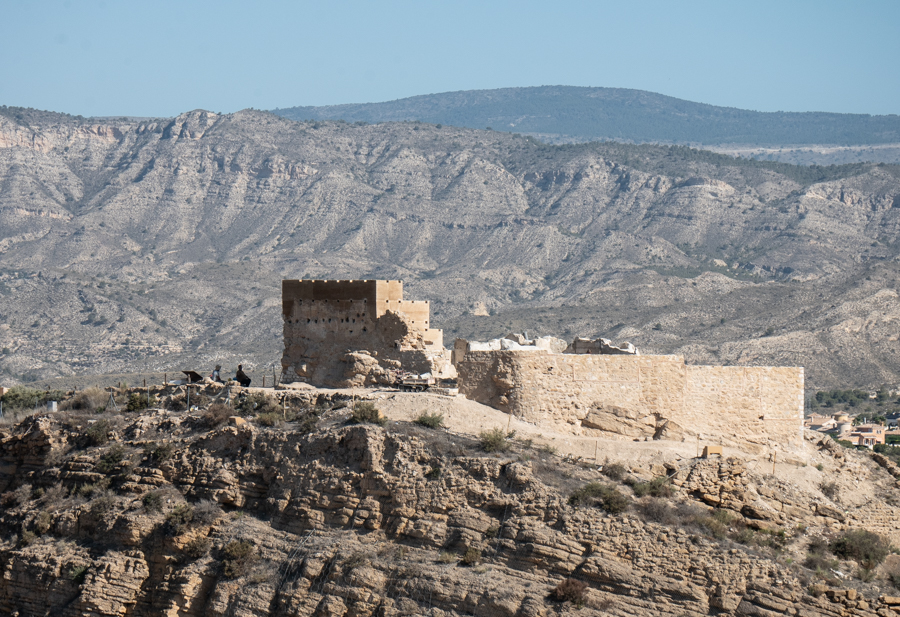
29_6
Two of the cats in Verdegás:
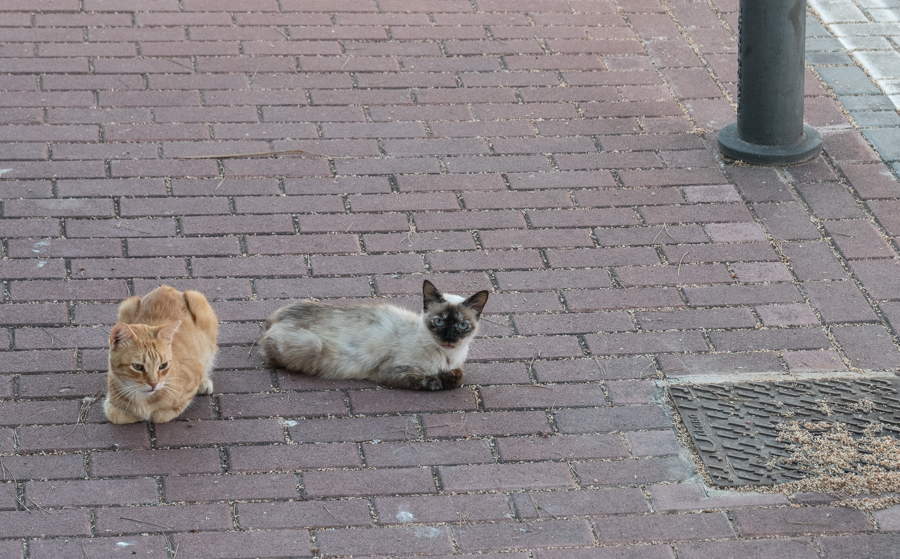
29_7
During the week, I went out for lunch with my colleague and friend Eri. She was waiting for important news from her native Greece to which she would need to react immediately, so she had to have her laptop open during our lunch. In the end, we still had a pleasant lunch and conversation:
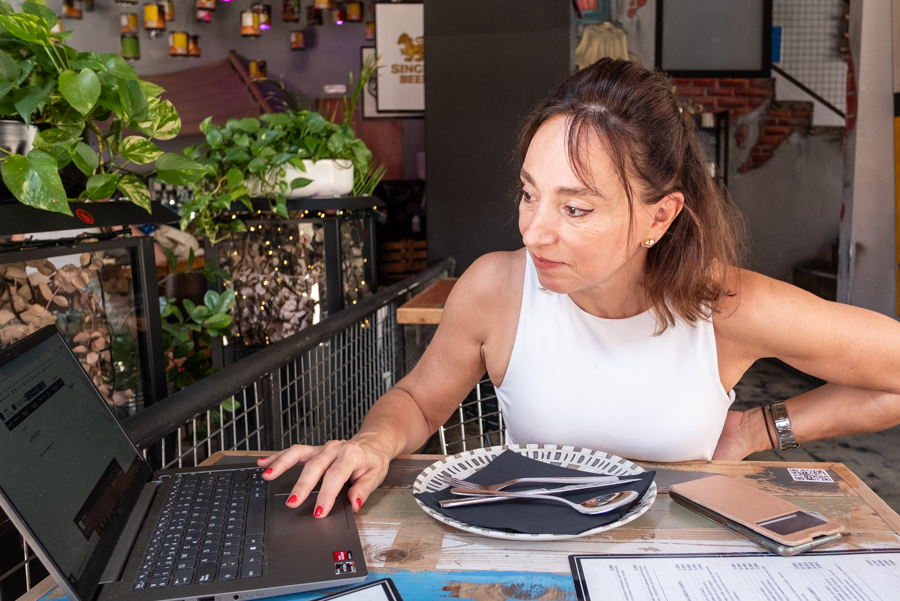
29_8
Even though I have now lived in Alicante almost 17 years, I continue to discover new details when walking around the centre, like these quirky balcony decorations that people put up:
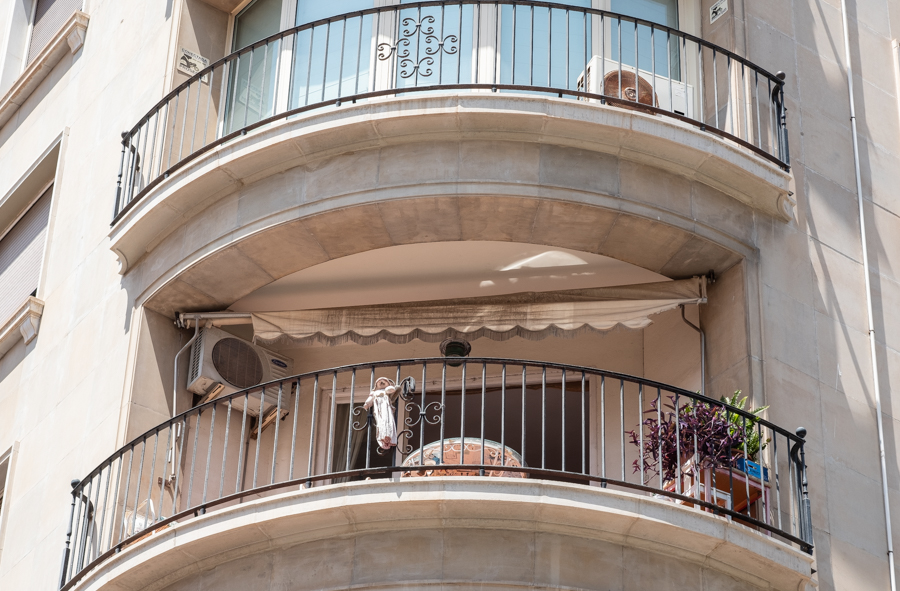
29_9
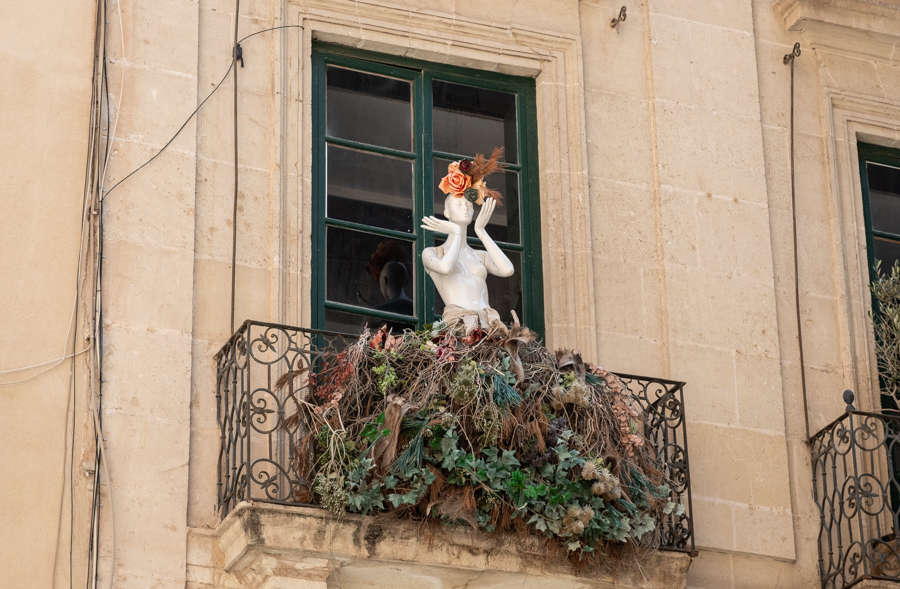
29_10
While walking past the Civil War museum on Plaza Seneca (where there are several air raid shelters that can be visited), I noticed some memorial plaques that drew my curiosity. This one lists local people who died during the war, either murdered by Franco’s troops or in some cases by suicide as the city was being surrounded on all sides:
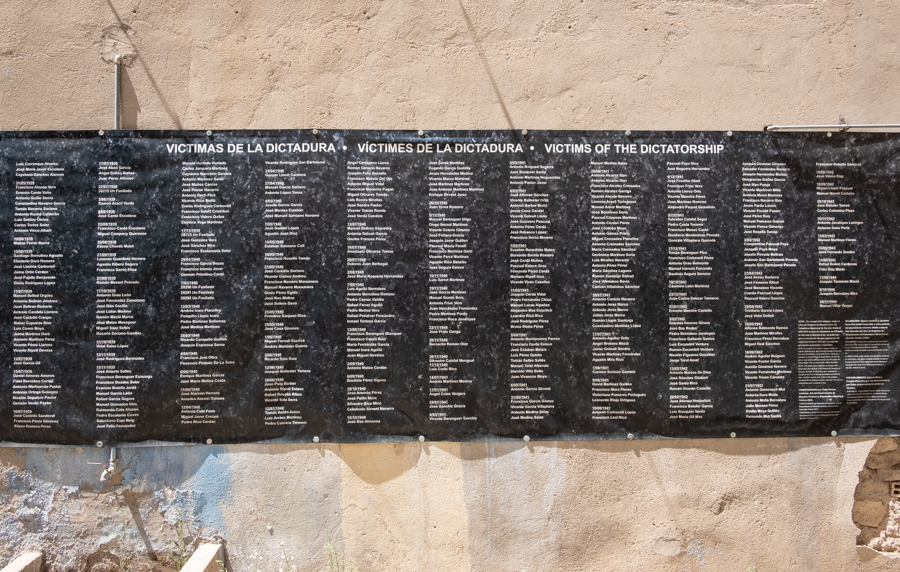
29_11
Alicante was one of the last cities to fall to the fascists in 1939; while some republican fighters escaped by sea from Alicante harbour in the closing weeks of the war, many did not:
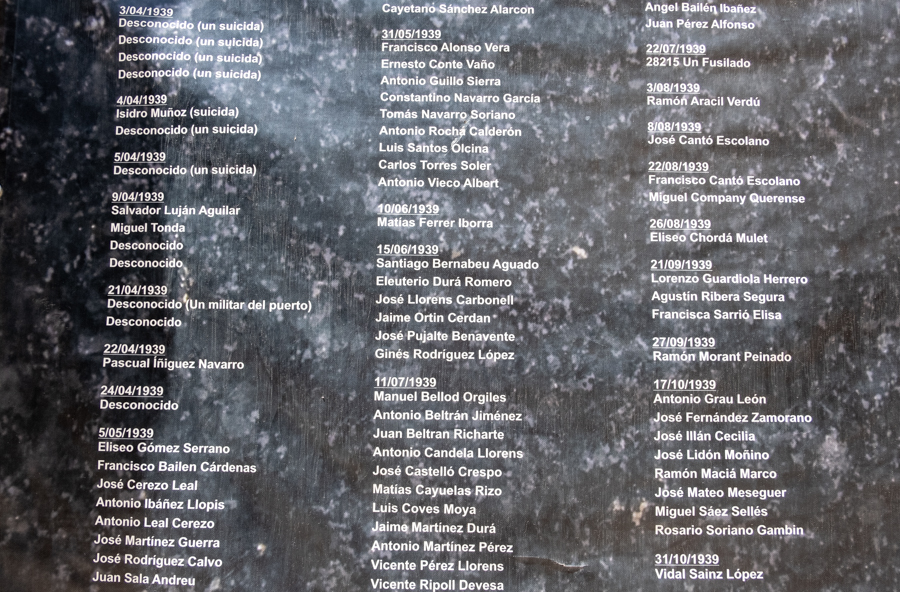
29_12
Alicante was also heavily bombed throughout the war, by Italian and German bombers who used the Spanish Civil War as a training exercise. Virtually all the victims were civilians; Alicante has no manufacturing and there were few if any military targets. The most notorious incident was the bombing by Italian planes of the Mercado Central on 25 May 1938, in which more than 300 people were killed and more than 1000 injured. So there is a separate plaque for the victims of the bombings:
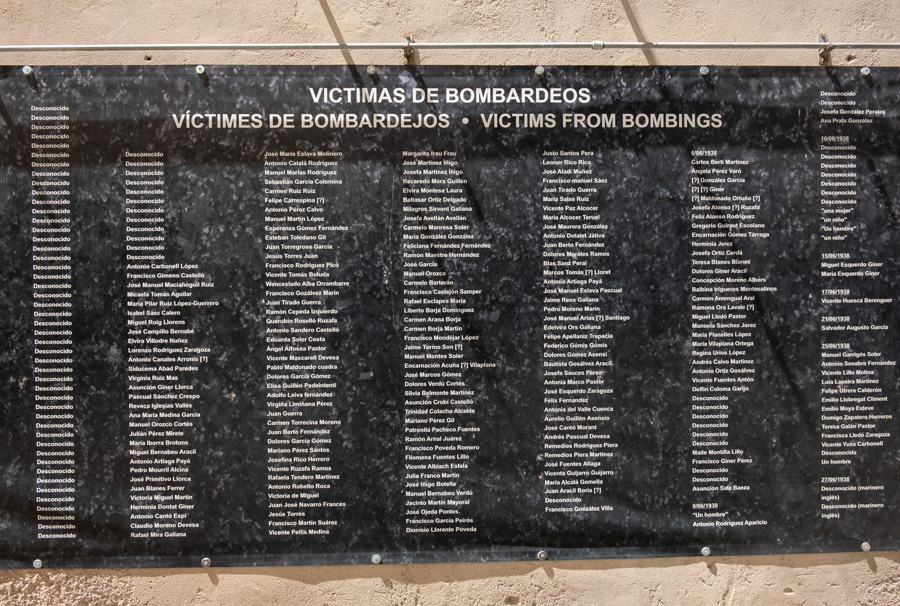
29_13
I took a quick peek inside; there was a display of republican posters:
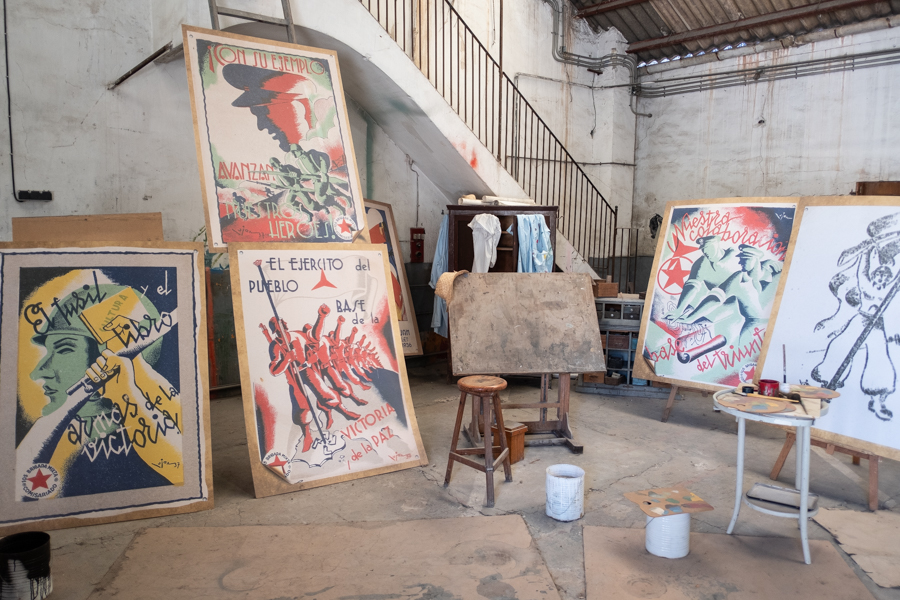
29_14
And a display of lifesize photographs and an actual bomb (presumably emptied of explosives…):
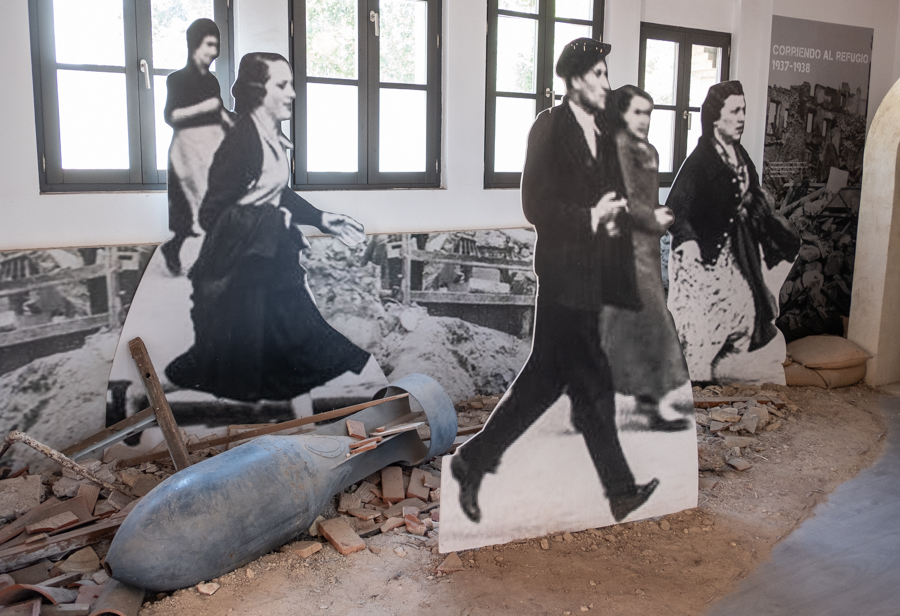
29_15
On Thursday morning I took the train to Madrid, and then made my way to one of the city’s central squares, Plaza Puerta del Sol. I arrived there around 10 a.m. Normally the square is very crowded but on this day in late July it felt half-empty, with some walking tour guides waiting for customers (at this time of the year, there are not so many tourists in Madrid, and many of the madrileños escape to the Mediterranean coast or to the north of Spain to enjoy lower temperatures):
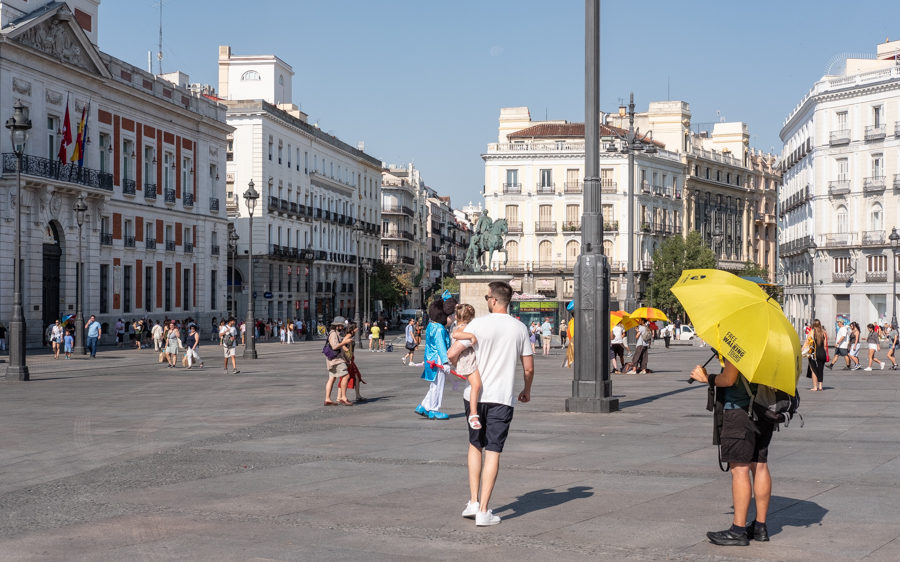
29_16
Always on the lookout for photo opportunities, I spotted this couple, lost in each other here in the middle of Madrid:
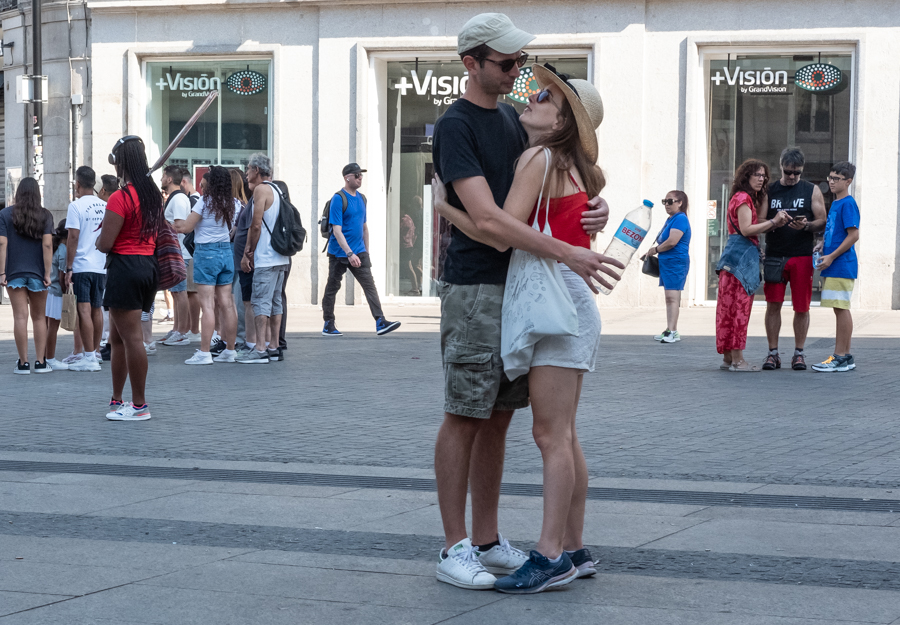
29_17
But I had not come to Sol just to walk around. I had planned my itinerary for the day, and the first place I was going to visit was the Real Academia de Bellas Artes San Fernando, located on the nearby Calle Alcála. As the name implies, it is not a photo gallery but a general art institution, with many paintings by Spanish artists, such as this large painting, “Buddha’s temptations” by Eduardo Chicharro Agüera (1873-1949):
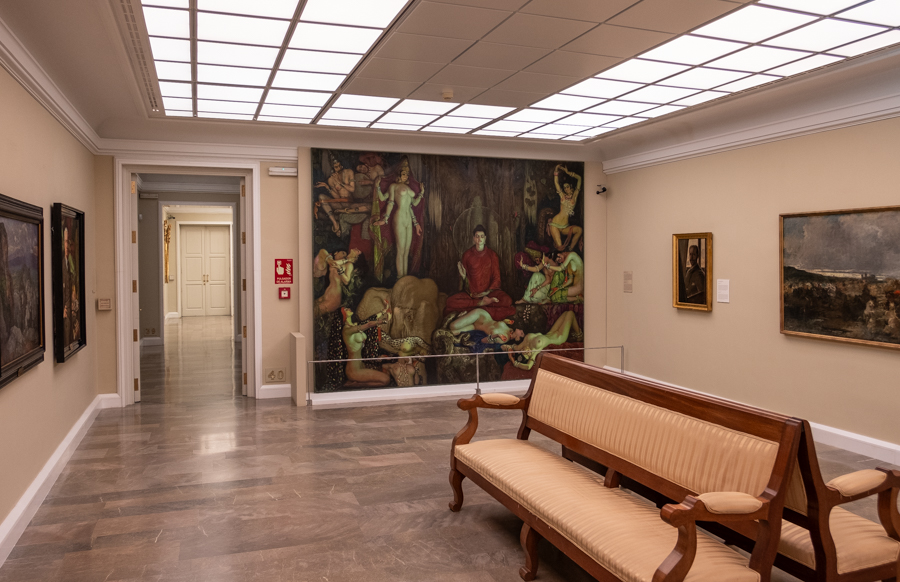
29_18
But the Real Academia was also hosting one of the PhotoEspaña exhibitions I wanted to see, “A Dane in Madrid”, works by Danish photographer Christian Franzen (1864-1923) who moved to Madrid from Copenhagen in 1894 and became the most celebrated portrait photographer of his time, photographing kings, princes, other members of the upper classes, and his artist friends. Today he is a bit forgotten, and the purpose of this exhibition was to show off his excellent body of work:
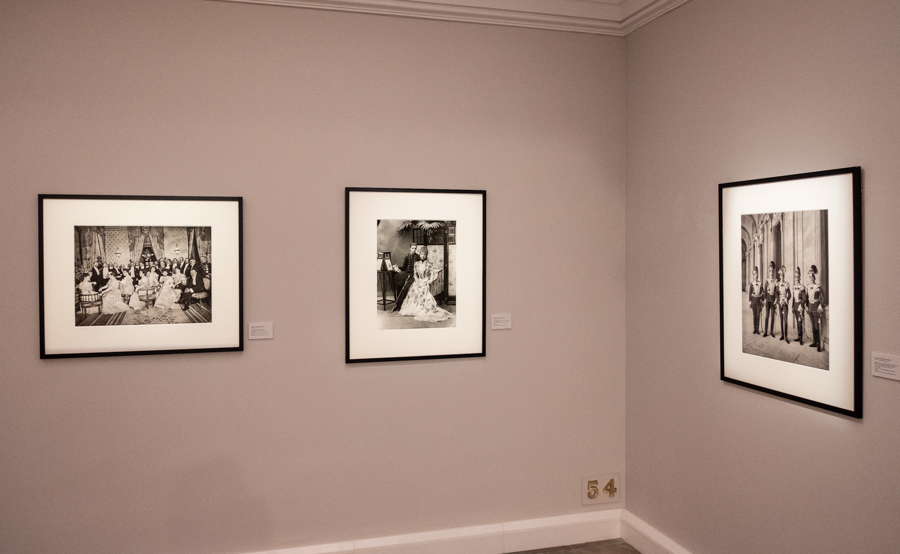
29_19
I walked back to Sol to go to my next exhibition, on Calle Mayor. Along the way, the African street vendors were plying their trade, selling counterfeit bags and football shirts. They are always ready to yank the corners of their sheet to convert it into a bundle and run away if need be:
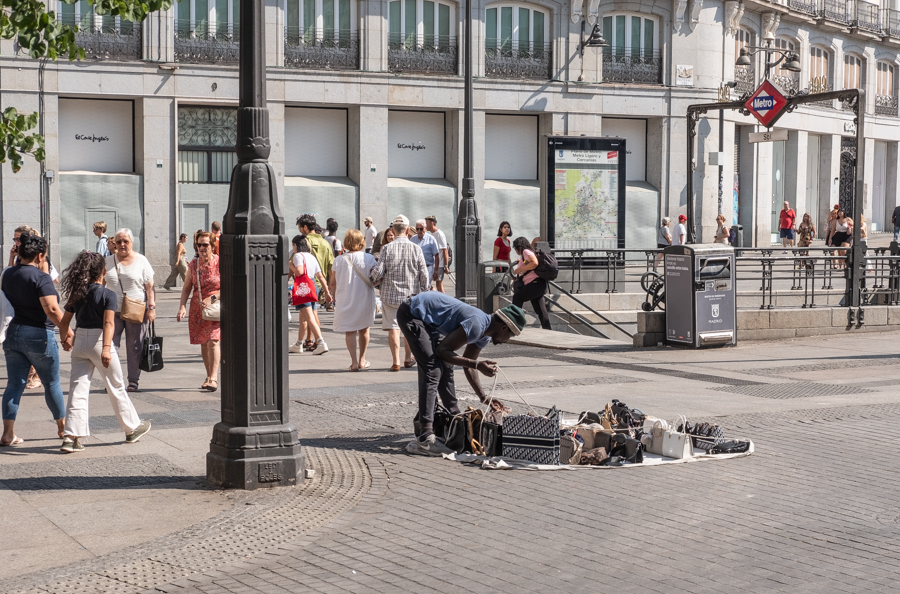
29_20
However, in this case they did not seem too bothered by the presence of the police van:
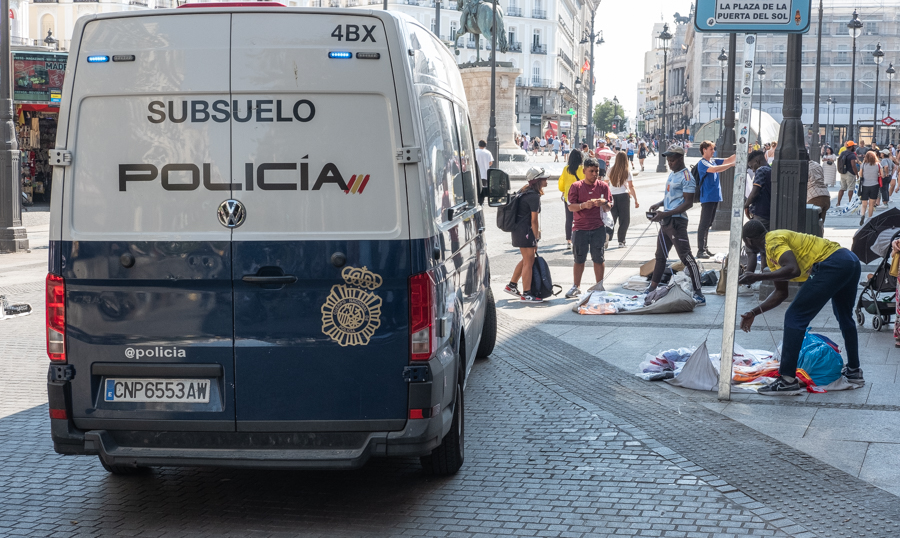
29_21
Walking on Calle Mayor, I spotted this couple with a small dog:
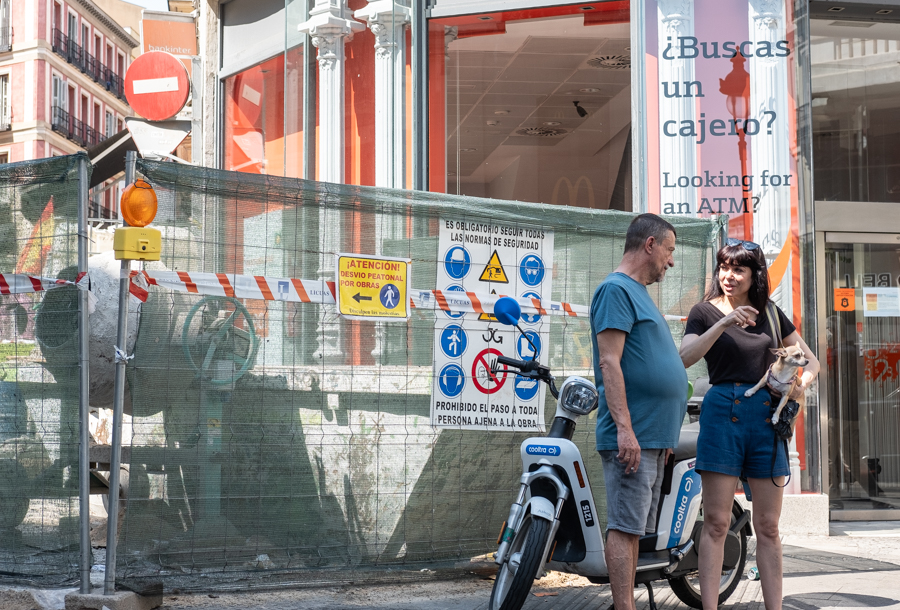
29_22
The doggie was in good hands:
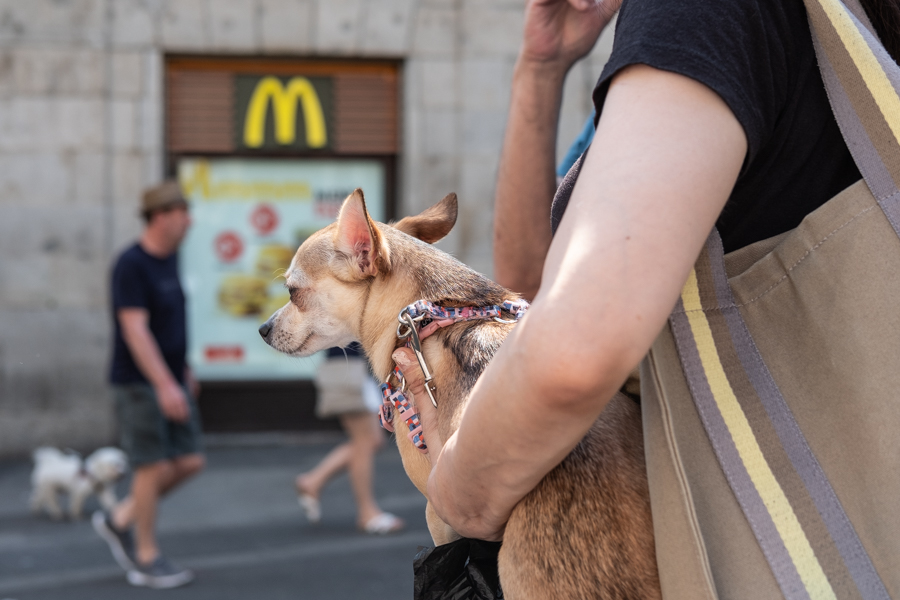
29_23
My next stop was the Círculo de Bellas Artes, a place I like for a variety of reasons, not least the beautiful building and the excellent restaurant where I was planning to have lunch. And this is what I did, after visiting an interesting exhibition by Japanese photographer Masahisa Fukase and one by Spanish photographer Cristina García Rodero, who spent several years travelling around Spain during the 1970s and 80s, documenting local fiestas and religious traditions. The restaurant is a feast for the eyes and the palate:
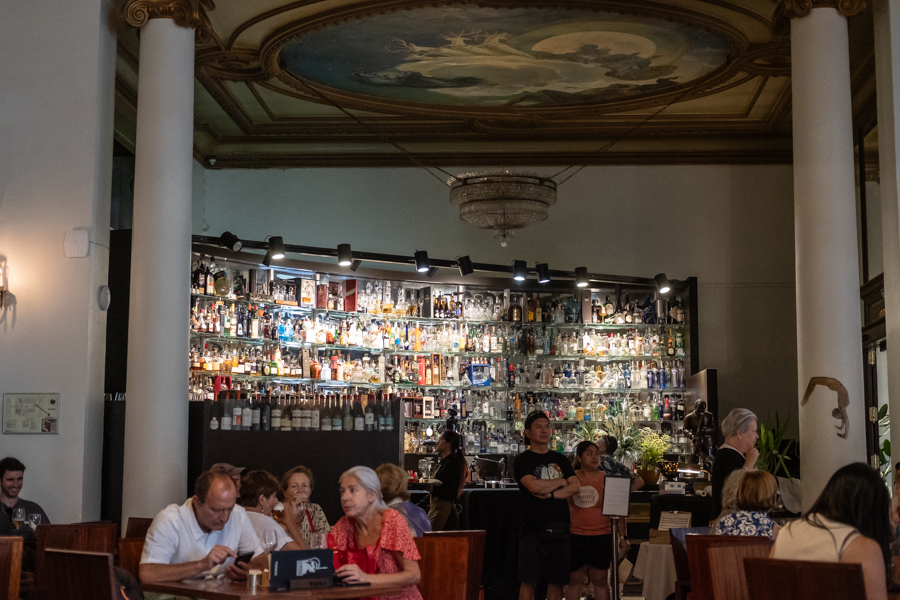
29_24
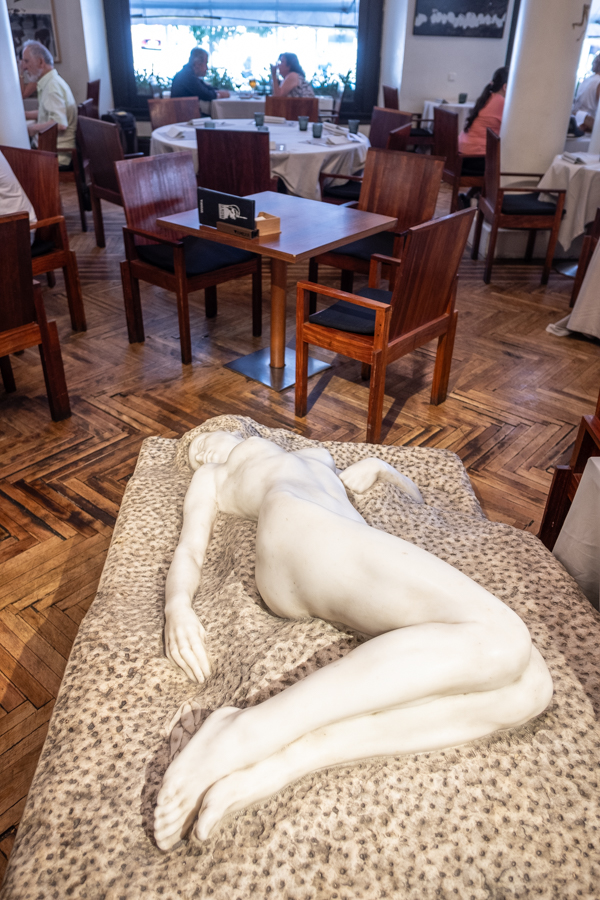
29_25
After lunch, I went back into the metro (the temperature was now in the high 30s, so not a good day for walking around) to go to a bar near the Prado and Galeria Reina Sofía that I like. Fittingly, the metro station serving that area is called Estación del Arte:
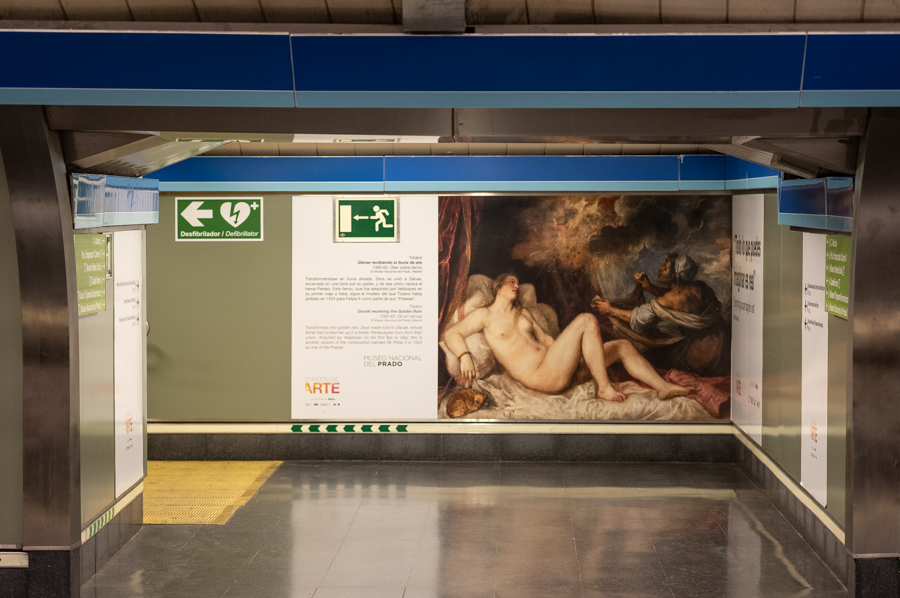
29_26
I sat down for a beer under one of the umbrellas in front of the bar El Brilliante. A woman at the neighbouring table was doing something one really should not do. The pigeons are a pest, no need to encourage them even more:
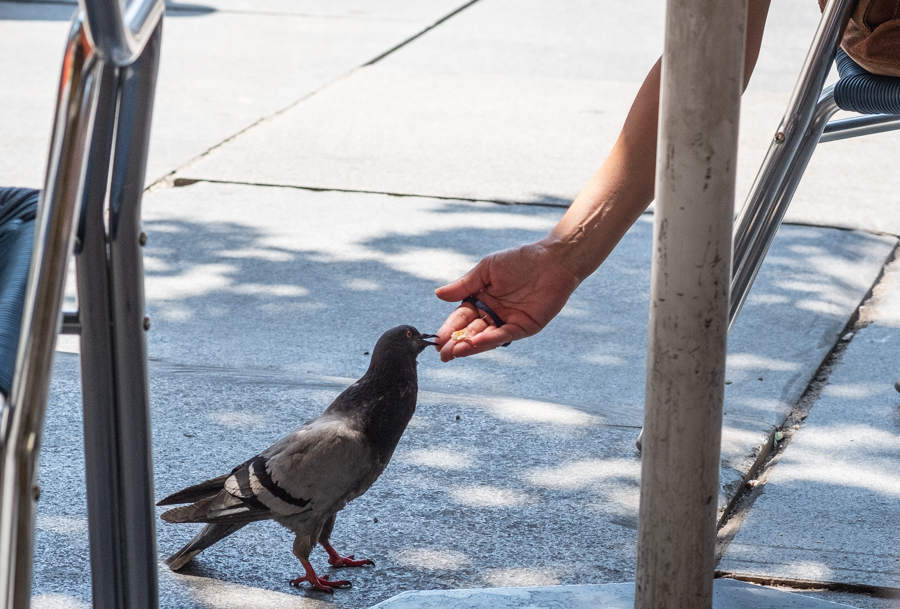
29_27
There were most certainly no takers for the tables that were not in the shade:
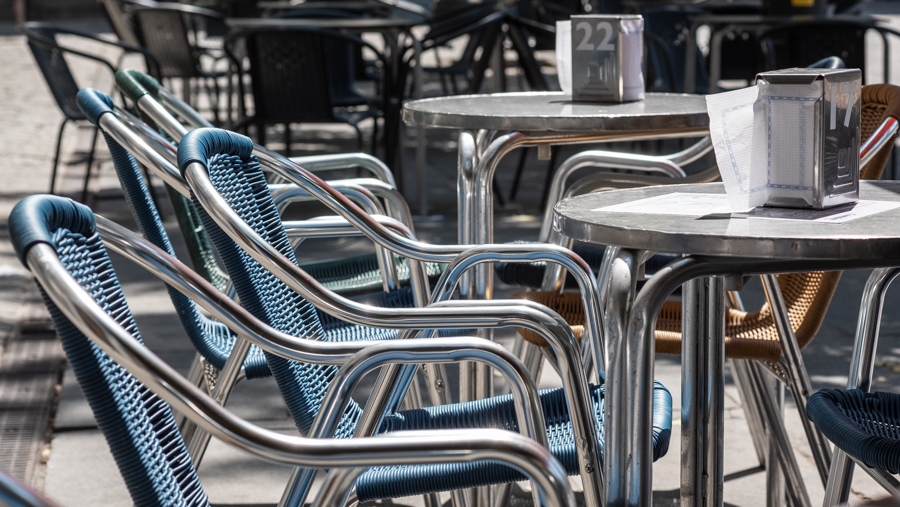
29_28
Outside the bar, another African vendor, selling Kylian Mbappé shirts. Mbappé is probably the world’s best player right now. He joined Real Madrid from Paris-St. Germain this summer and has yet to play a competitive game for his new club. But shirts with his name and number are everywhere already, genuine and fake:
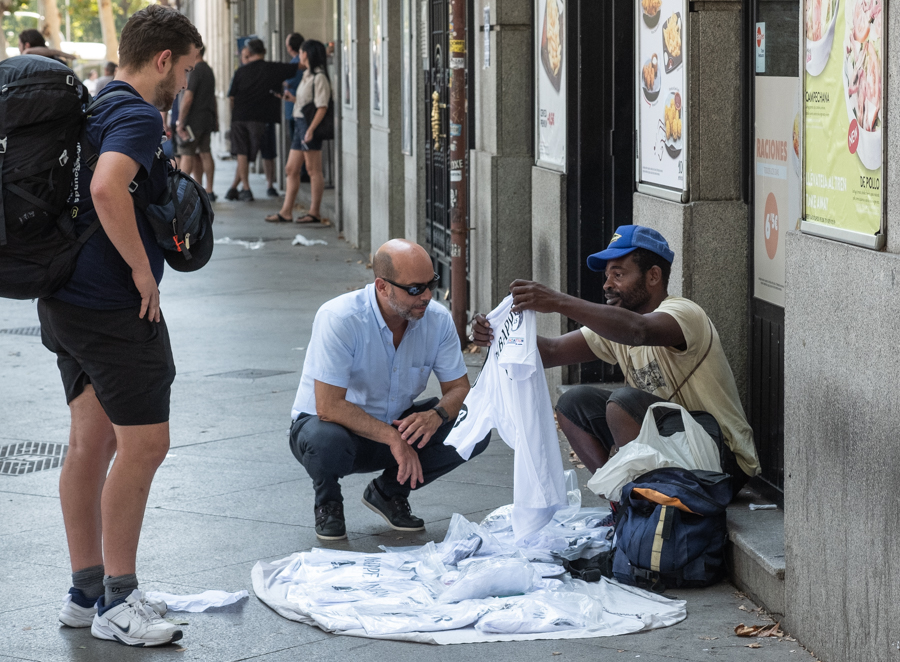
29_29
The next item on my agenda was an exhibition in Casa de América on Plaza Cibeles. As the name implies, it is a centre dedicated to promote the links between Spain and the Americas, housed in a beautiful palace built in the late 19th century:
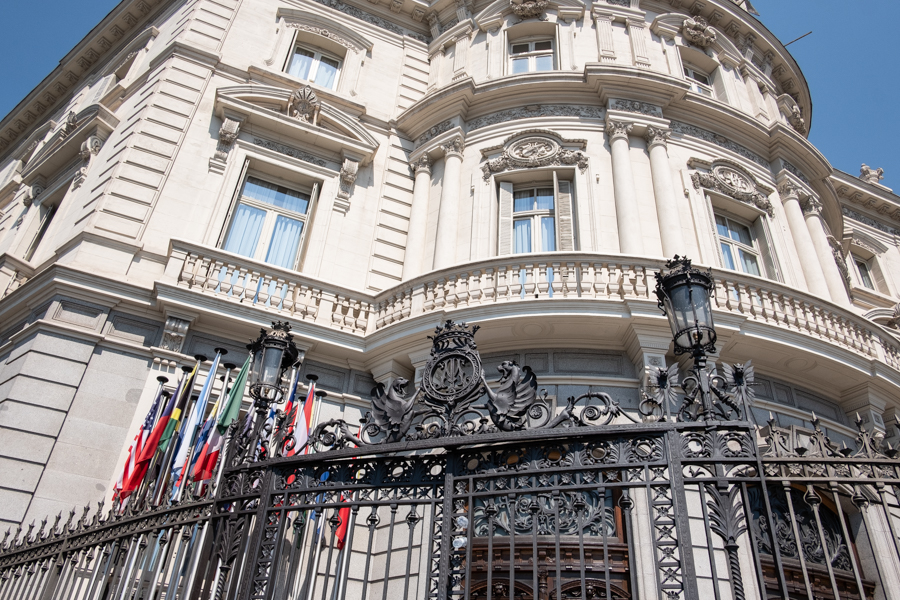
29_30
The exhibition space was closed because of a local holiday (one of those obscure holidays not observed by everyone), so I just took a short break in the garden, named after Latin America’s greatest writer, Gabriel García Márquez:
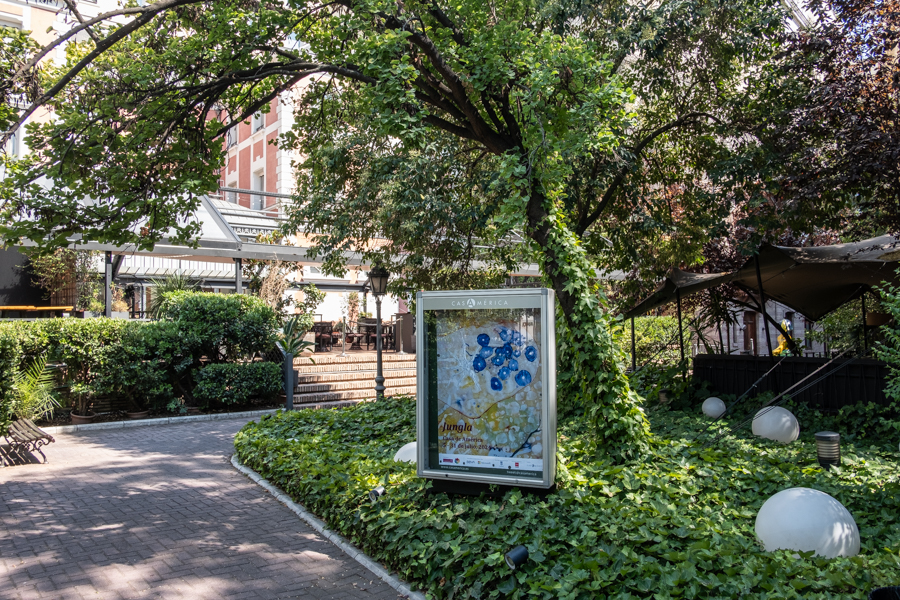
29_31
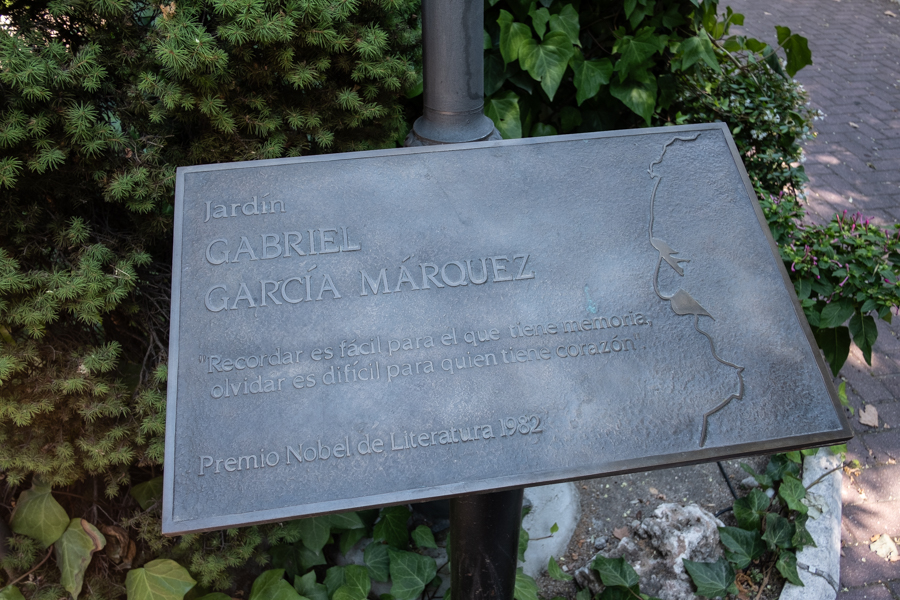
29_32
There is also a plaque sponsored by Daughters of the American Revolution, commemorating Spain’s assistance to the rebels during the War of Independence (of course, the fact that the US and Spain fought a war a bit over 100 years later is politely not mentioned):
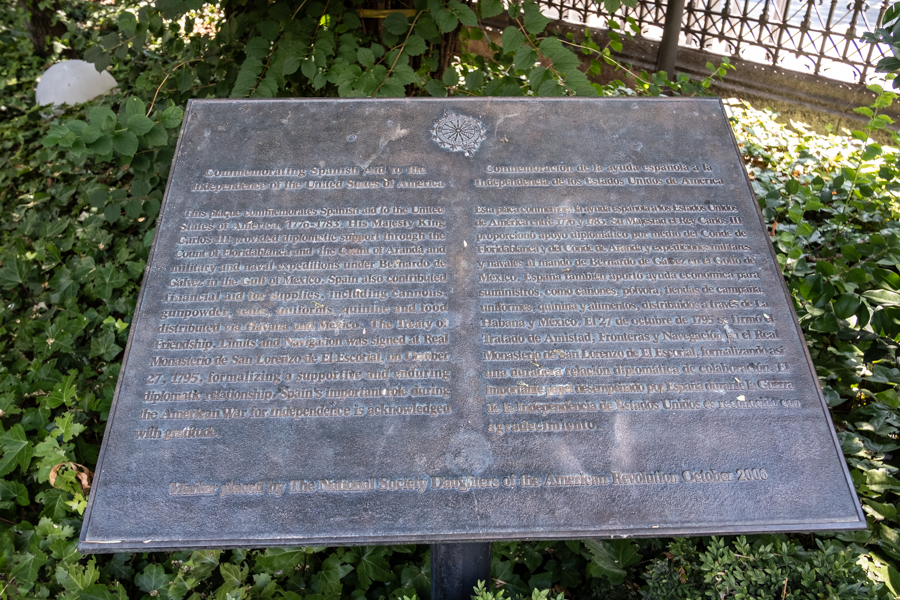
29_33
Then it was time to take a bus to Plaza de Castilla in the northern part of the city, close to the train station from where I would go back to Alicante a couple of hours later. Plaza de Castilla is best known for these two iconic towers, one owned by a bank and the other by an insurance company:
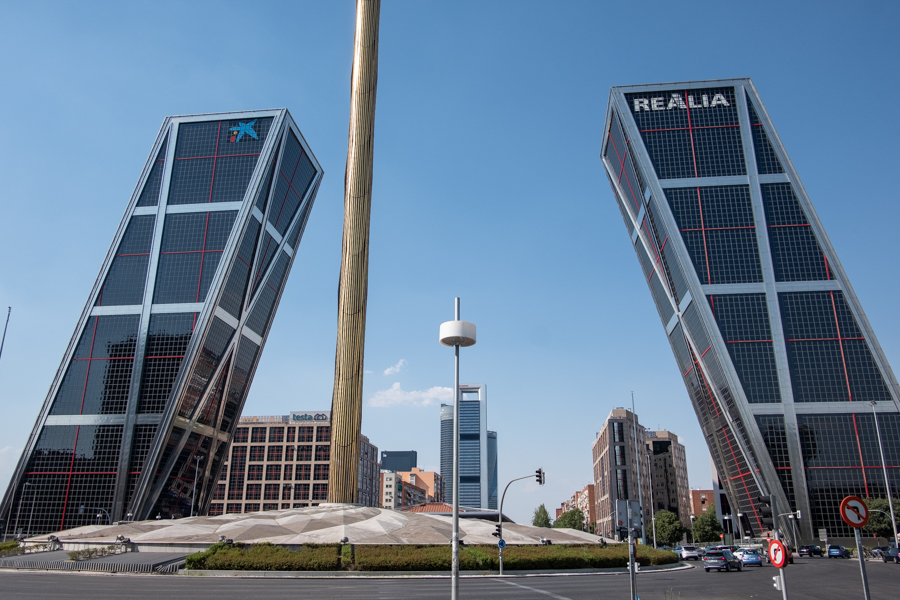
29_34
After visiting what turned out to be the highlight of the day, “La comedia humana” with more than 150 original prints by Elliott Erwitt, I made my way to the Chamartin train station. I do not like it very much, except for this nicely illuminated wall that one sees while walking from the metro station to the main train station:
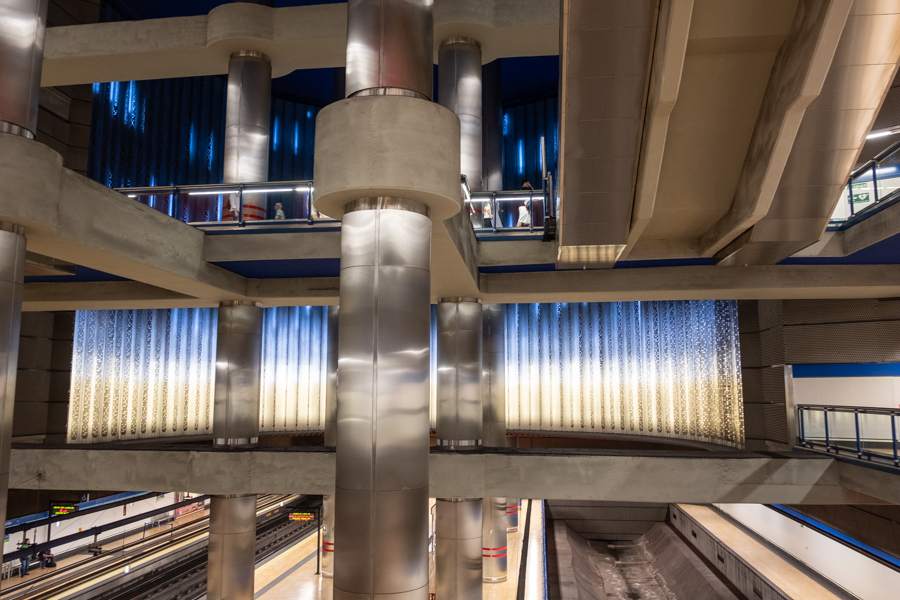
29_35
One of the reasons I do not like Chamartin very much is that the waiting area is very crowded. But at least this time I enjoyed seeing another passenger waiting for his train:
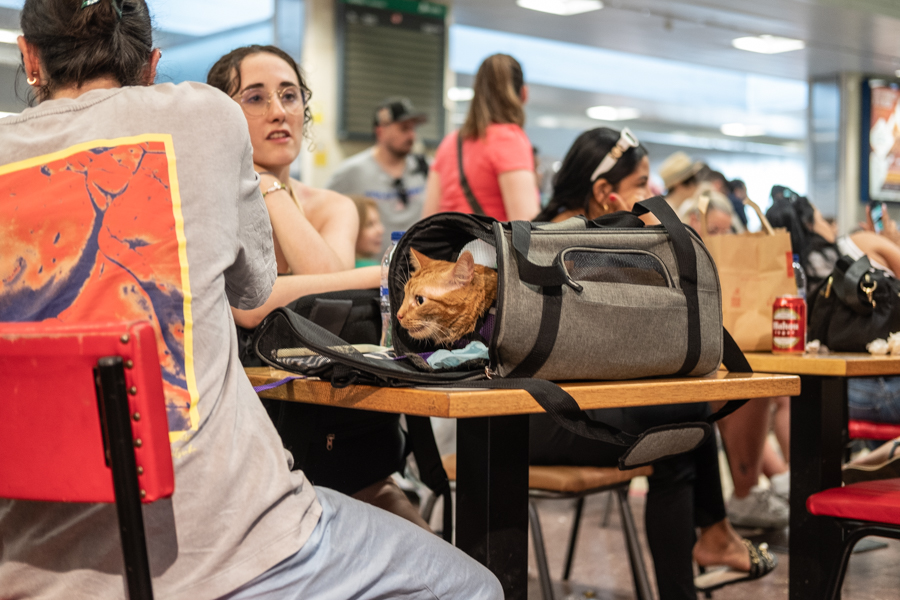
More photos from my day in Madrid can be seen here.
The rest of the photos are from my bicycle ride to the Carrasqueta mountain pass. It is one of the harder rides in my reportoire, especially in July, when the inland temperature easily hits 40C or more.
29_36
The distance from my house to the pass is 35 km of more or less constant climbing from sea level where I live to 1020 meters. About 6 km from the top there is a roadside bar called Venta Teresa where I always stop for a drink and a rest before the final climb:
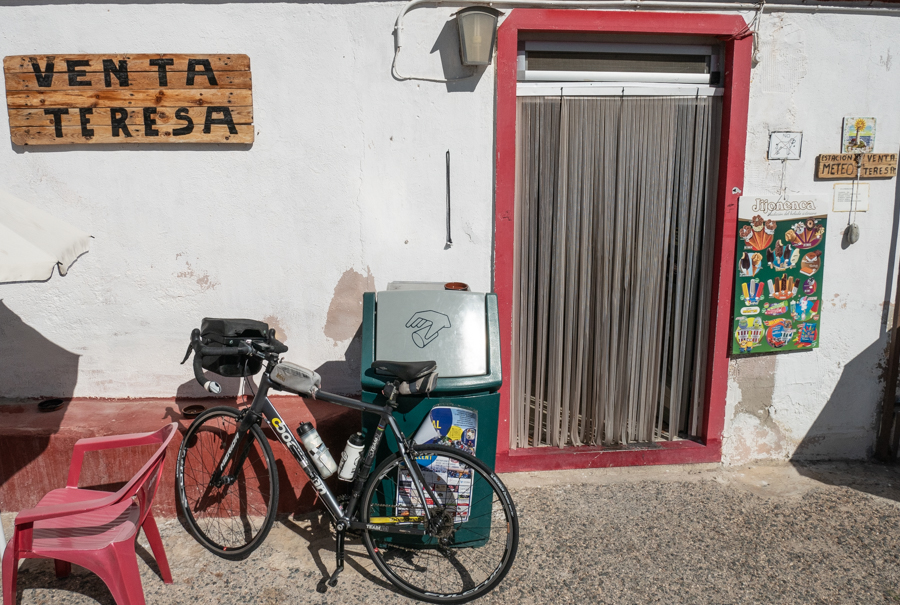
29_37
I love the quirky decorations at Venta Teresa, like this “weather station” (if the stone is hot, it is sunny; if it is wet, it is raining; if it is moving, it is windy, etc.):
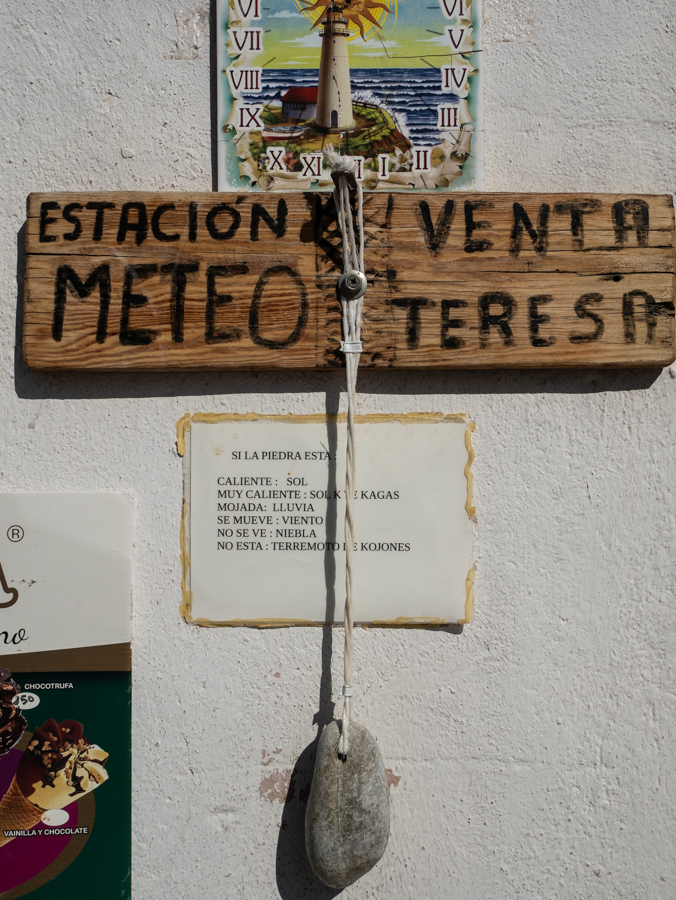
29_38
Reuse of an old tyre:
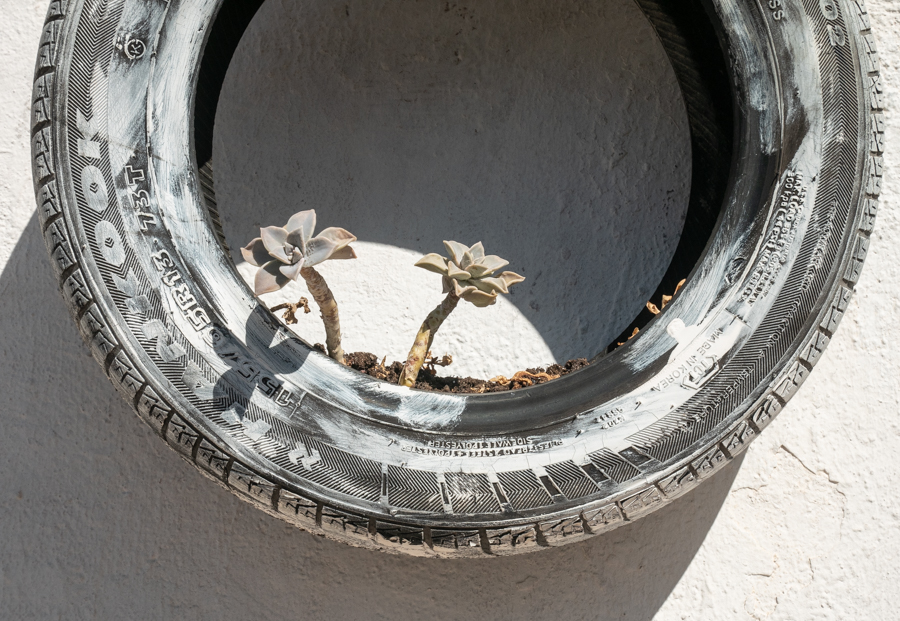
29_39
Inside Venta Teresa, the owner was having a snack and chatting with another guest:
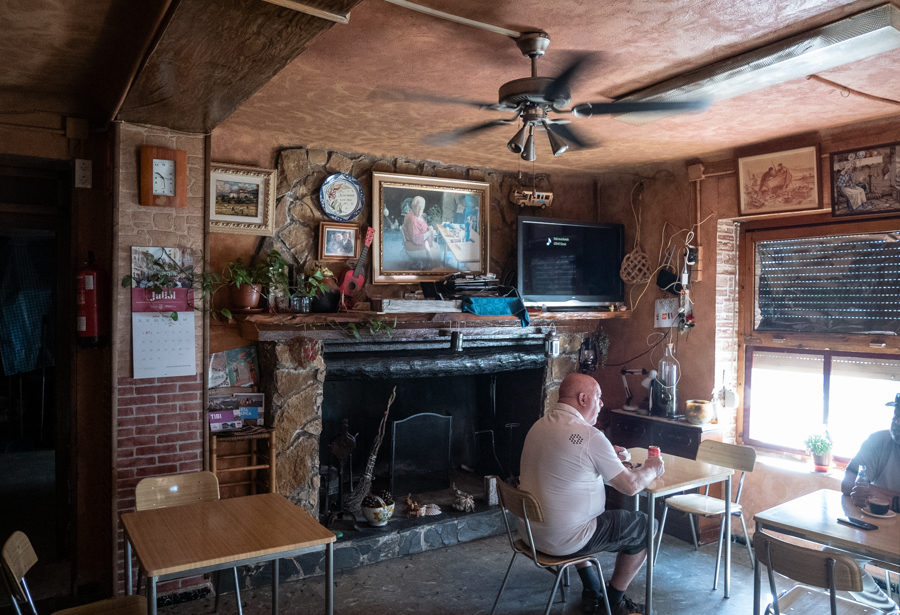
29_40
Lots of nice little details inside also:
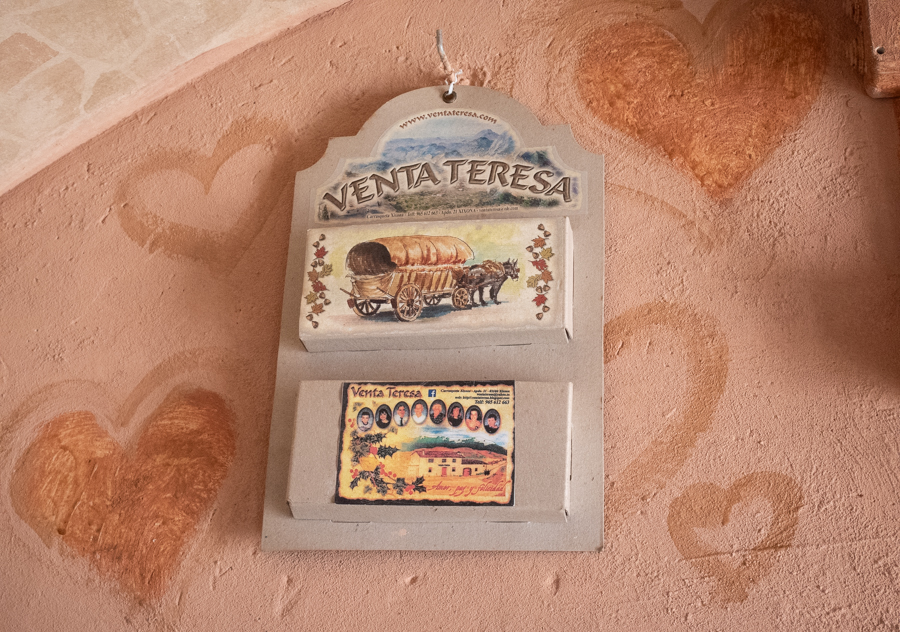
29_41
The place has been owned by the same family for at least 2 generations, and there are a lot of old photos and other memorabilia around. Venta Teresa is especially popular among motorcyclists who enjoy the long, twisty mountain road (sometimes with sad consequences, alas):
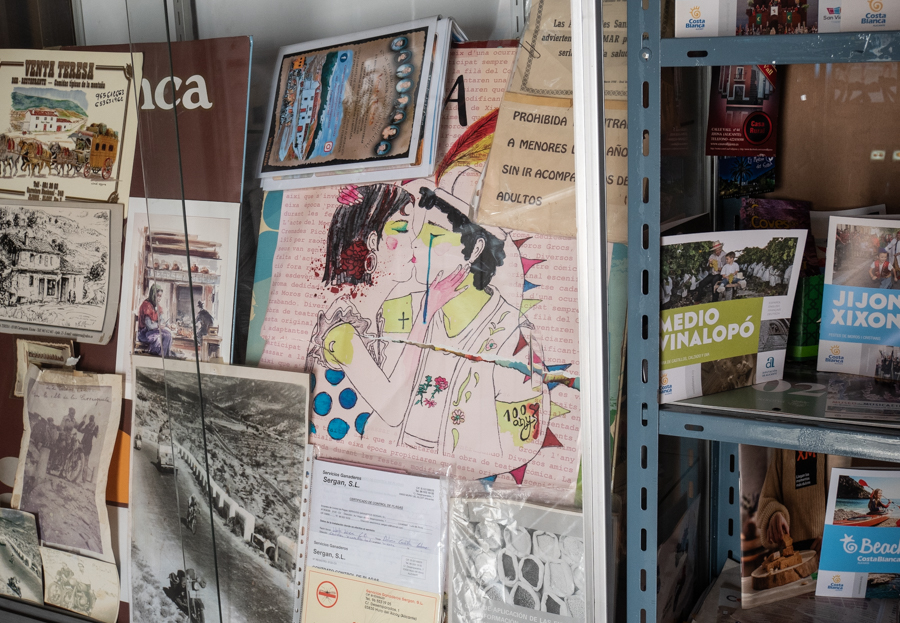
29_42
I did not see many other cyclists, probably due to the heat, but one did pass by Venta Teresa while I was having my Coke:
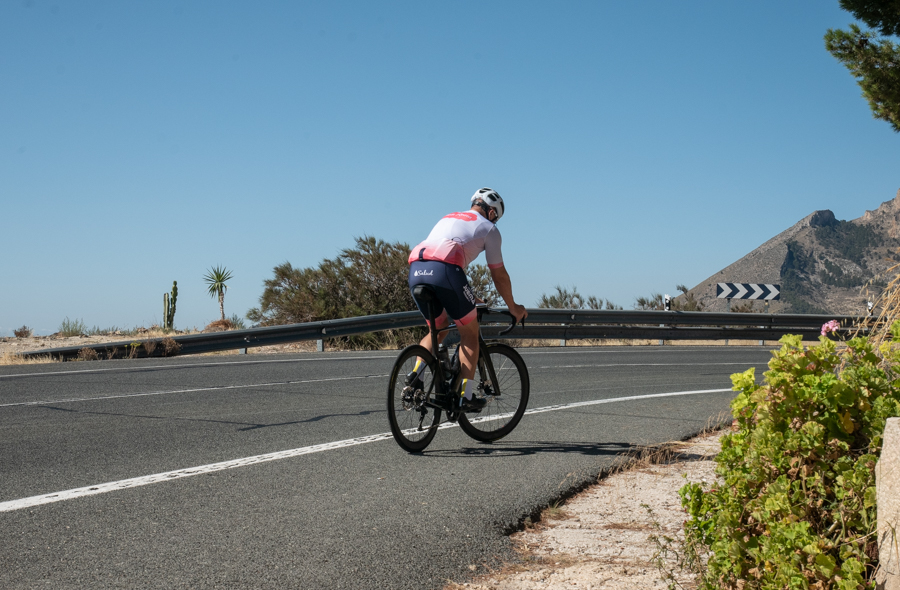
29_43
Finally, I was at the top and could enjoy my banana and the view:
